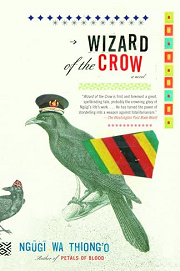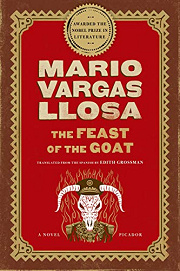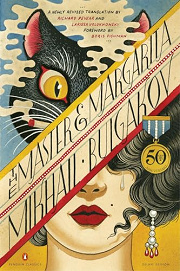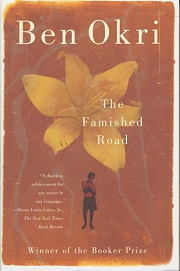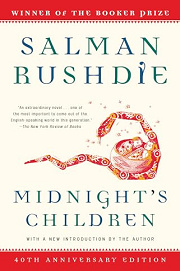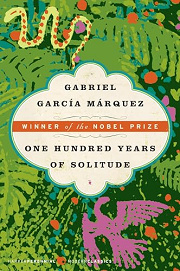Share your thoughts in a quick Shelf Talk!
Wizard of the Crow by Ngũgĩ wa Thiong'o
A dictator dreams of godhood while his nation teeters on the edge of absurdity and revolt. In the shadow of power, a mysterious healer known as the Wizard of the Crow becomes the unlikely fulcrum of hope, satire, and resistance. With biting wit and dazzling imagination, Wizard of the Crow turns tyranny on its head and invites you to believe in the magic of defiance.
Have you read this book? Share what you liked (or didn’t), and we’ll use your answers to recommend your next favorite read!
Love Wizard of the Crow but not sure what to read next?
These picks are popular with readers who enjoyed this book. Complete a quick Shelf Talk to get recommendations made just for you! Warning: possible spoilers for Wizard of the Crow below.
In Wizard of the Crow, did you enjoy ...
... the ruthless palace maneuvering around a feared strongman and his cronies?
The Feast of the Goat by Mario Vargas Llosa
If you were gripped by the scheming around the Ruler—the ministers inflating their status (and sometimes their bodies), the farcical “Marching to Heaven” project, and the backstabbing that dogs Kamiti and Nyawira—then Llosa’s portrait of Trujillo’s Dominican Republic will hook you. You’ll recognize the same claustrophobic corridors of power: inner-circle loyalists plotting survival, a tyrant’s whims bending reality, and citizens caught in the crossfire. Where Aburiria’s cabinet scrambles to read the Ruler’s moods, Trujillo’s generals and fixers do the same, and the consequences are just as chilling.
... acerbic, surreal satire that skewers bureaucracy and power with laugh-out-loud absurdity?
The Master and Margarita by Mikhail Bulgakov
Loved how the Ruler’s regime became so ridiculous it looped back to terrifying—like the ministers’ grotesque body modifications and the epidemic of "queuing sickness"? Bulgakov’s devil, Woland, strolls into Moscow and turns hypocrites and functionaries inside out—much like how Kamiti’s "wizard" persona exposes Aburiria’s rot. The pranks, show trials, and magical visitations here channel the same darkly comic energy as the Ruler’s ballooning ego and the Global Bank circus, but with a mischievous supernatural bite.
... shape-shifting, myth-tinged magic that blurs the line between the spirit world and a troubled nation?
The Famished Road by Ben Okri
If Kamiti’s oracular "Wizard of the Crow" acts—his healing trances, prophetic masks, and spirit-laced tricks—enchanted you, Azaro’s life as a spirit child will feel like home. Okri’s visions fold into everyday struggle just as Kamiti’s rituals do in Aburiria; the uncanny isn’t explained, it’s lived. And like Nyawira’s underground resistance, the story pulses with political unrest, where visitations and omens illuminate the costs of corruption and the resilience of the poor.
... nation-sized allegory where personal bodies and fates mirror the fractured body politic?
Midnight's Children by Salman Rushdie
Ngũgĩ’s satire makes the Ruler’s body literally swell with power and illness, and the whole "Marching to Heaven" fiasco turns development into grotesque theater. Rushdie plays a similar game: Saleem Sinai’s body bears India’s history, his telepathic “midnight’s children” echoing the way Aburiria’s masses are conscripted into the Ruler’s dreams. If the symbolism of queues, potions, and public spectacle spoke to you, Saleem’s cracked-narrator chronicle of a nation becoming itself will, too.
... a sprawling, many-voiced community where the miraculous and the political entwine across generations?
One Hundred Years of Solitude by Gabriel García Márquez
If you loved how Ngũgĩ roamed from Kamiti and Nyawira to the Ruler and his sycophants—building Aburiria through a whole chorus of lives—Macondo’s Buendías offer that same polyphonic power. The rain of yellow flowers, the insomnia plague, and Remedios’s ascent echo the matter-of-fact marvels you enjoyed, while the town’s brushes with imperial companies and state violence rhyme with the Global Bank farce and the security crackdowns chasing the Movement for the Voice of the People.
Unlock your personalized book recommendations! Just take a quick Shelf Talk for Wizard of the Crow by Ngũgĩ wa Thiong'o. It’s only a few questions and takes less than a minute.
